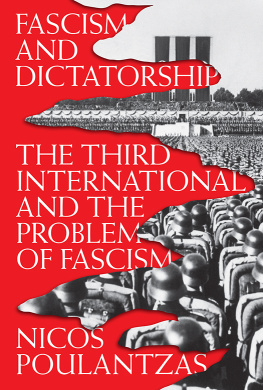
The author and publisher have provided this e-book to you for your personal use only. You may not make this e-book publicly available in any way. Copyright infringement is against the law. If you believe the copy of this e-book you are reading infringes on the authors copyright, please notify the publisher at: us.macmillanusa.com/piracy.
CONTENTS
I.
II.
III.
IV.
V.
VI.
VII.
VIII.
IX.
X.
XI.
XII.
XIII.
Love, work and knowledge are the well-springs of our life. They should also govern it.
WILHELM REICH

PREFACE
to the Third Edition, Revised and Enlarged
Extensive and painstaking therapeutic work on the human character has led me to the conclusion that, as a rule, we are dealing with three different layers of the biopsychic structure in the evaluation of human reactions. As I demonstrated in my book Character-Analysis, these layers of the character structure are deposits of social development, which function autonomously. On the surface layer of his personality the average man is reserved, polite, compassionate, responsible, conscientious. There would be no social tragedy of the human animal if this surface layer of the personality were in direct contact with the deep natural core. This, unfortunately, is not the case. The surface layer of social cooperation is not in contact with the deep biologic core of ones selfhood; it is borne by a second, an intermediate character layer, which consists exclusively of cruel, sadistic, lascivious, rapacious, and envious impulses. It represents the Freudian unconscious or what is repressed; to put it in the language of sex-economy, it represents the sum total of all so-called secondary drives.
Orgone biophysics made it possible to comprehend the Freudian unconscious, that which is antisocial in man, as a secondary result of the repression of primary biologic urges. If one penetrates through this destructive second layer, deeper into the biologic substratum of the human animal, one always discovers the third, deepest, layer, which we call the biologic core. In this core, under favorable social conditions, man is an essentially honest, industrious, cooperative, loving, and, if motivated, rationally hating animal. Yet it is not at all possible to bring about a loosening of the character structure of present-day man by penetrating to this deepest and so promising layer without first eliminating the nongenuine, spuriously social surface. Drop the mask of cultivation, and it is not natural sociality that prevails at first, but only the perverse, sadistic character layer.
It is this unfortunate structuralization that is responsible for the fact that every natural, social, or libidinous impulse that wants to spring into action from the biologic core has to pass through the layer of secondary perverse drives and is thereby distorted. This distortion transforms the original social nature of the natural impulses and makes it perverse, thus inhibiting every genuine expression of life.
Let us now transpose our human structure into the social and political sphere.
It is not difficult to see that the various political and ideological groupings of human society correspond to the various layers of the structure of the human character. We, however, decline to accept the error of idealistic philosophy, namely that this human structure is immutable to all eternity. After social conditions and changes have transmuted mans original biologic demands and made them a part of his character structure, the latter reproduces the social structure of society in the form of ideologies.
Since the breakdown of the primitive work-democratic form of social organization, the biologic core of man has been without social representation. The natural and sublime in man, that which links him to his cosmos, has found genuine expression only in great works of art, especially in music and in painting. Until now, however, it has not exercised a fundamental influence on the shaping of human society, if by society we mean the community of mankind and not the culture of a small, rich upper class.
In the ethical and social ideals of liberalism we recognize the advocacy of the characteristics of the surface layer of the character, which is intent upon self-control and tolerance. This liberalism lays stress upon its ethics for the purpose of holding in suppression the monster in man, our layer of secondary drives, the Freudian unconscious. The natural sociability of the deepest third layer, the core layer, is foreign to the liberal. He deplores the perversion of the human character and seeks to overcome it by means of ethical norms, but the social catastrophes of the twentieth century show that he did not get very far with this approach.
Everything that is genuinely revolutionary, every genuine art and science, stems from mans natural biologic core. Thus far, neither the genuine revolutionary nor the artist nor scientist has won favor with masses of people and acted as their leader, or if he has, he has not been able to hold them in the sphere of vital interest for any length of time.
The case of fascism, in contrast to liberalism and genuine revolution, is quite different. Its essence embodies neither the surface nor the depth, but by and large the second, intermediate character layer of secondary drives.
When this book was first written, fascism was generally regarded as a political party, which, as other social groups, advocated an organized political idea. According to this appraisal the fascist party was instituting fascism by means of force or through political maneuver.
Contrary to this, my medical experiences with men and women of various classes, races, nations, religious beliefs, etc., taught me that fascism is only the organized political expression of the structure of the average mans character, a structure that is confined neither to certain races or nations nor to certain parties, but is general and international. Viewed with respect to mans character, fascism is the basic emotional attitude of the suppressed man of our authoritarian machine civilization and its mechanistic-mystical conception of life.
It is the mechanistic-mystical character of modern man that produces fascist parties, and not vice versa.
The result of erroneous political thinking is that even today fascism is conceived as a specific national characteristic of the Germans or the Japanese. All further erroneous interpretations follow from this initial erroneous conception.
To the detriment of genuine efforts to achieve freedom, fascism was and is still conceived as the dictatorship of a small reactionary clique. The tenacity with which this error persists is to be ascribed to our fear of recognizing the true state of affairs: fascism is an international phenomenon, which pervades all bodies of human society of all nations. This conclusion is in agreement with the international events of the past fifteen years.
My character-analytic experiences have convinced me that there is not a single individual who does not bear the elements of fascist feeling and thinking in his structure. As a political movement fascism differs from other reactionary parties inasmuch as it is borne and championed by masses of people.
I am fully conscious of the enormous responsibility involved in making such an assertion. And in the interest of this lacerated world I should like the toiling masses to be just as clear about their responsibility for fascism.














